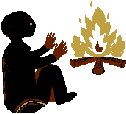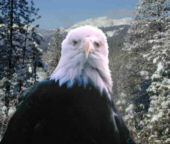| Ten thousand years ago our
ancestors roamed Earth ekeing out an existence. Bees were there,
too and those bees practiced a magic that the humans of that time had no
way to think about. The bees navigated by polarized sunlight.
Today, scientists know a lot about polarized light, a lot about the perceptions of various animals, and a lot about what information is, that it can be used by humans and bees to eke out an existence. They also understand a lot about human intelligence, those information processing skills which lead us from raw information to effective interaction with the world around us. But today there's a lot we don't
understand.
|


Magic!... |
| Today, we have a science that has been
around for only a very few centuries. Newton figured out his three
laws of motion at the end of the 17th century. Today, millions of
students learn those laws and pass their exams using what they learned.
But wait... Those students only rarely can actually use those laws, and a few decades ago some physics teachers looked carefully at what was actually believed by their students, and it turned out quite often that for about 95% it was the opposite of the laws they learned. They had not understood what they had learned. The math and the magic was missed. Furthermore, many of the teachers, those who wrote the textbooks anyway, demonstrated that they, too, did not understand much of what they had learned and then taught through their textbooks. "Everything was written by someone who didn't know what the hell he was talking about...they were teaching something they didn't understand and which was in fact useless." Feynman was talking about all of the textbooks submitted for K-12 use in California, and all were "perpetual absurdity...UNIVERSALLY LOUSY!" That was in the 1960's. In 2003, Physics Today reported little better understanding by the authors of, at least, middle school physics textbooks. And the publishers of the texts had shown no interest in making improvements while the studies of the texts were being made. |

Magic! |
| How can a human being today think about
what a bee sees in light and then navigates by...or what a bacterium or
bird perceives of the Earth's magnetic field and uses that, too, for navigation?
How can a human being today think about the color seen by a bird which requires a space of four, five, or six dimensions to organize all the perceived colors when human color requires only three dimensions? How can we think about acceleration, Newton's central concept in his laws of motion, that we can see those laws in action as we follow a handball bouncing around a handball court? We do think about "energy," that metaphorical notion of Aristotle for which we must constantly search for new sources as we work to exhaustion, as we exhaust our food supplies, and as we exhaust our fuel supplies. But then how must we think about an energy, born out of mathematics, which can have no sources or sinks, as the First Law of Thermodynamics assures us? How often do we clearly see when we are facing a profound puzzle — as we are here? How, indeed, can we think about a quantum jump, an electron having only statistical, wave-like existence, and a string vibrating in eleven dimensions? We need unfamiliar kinds of magic to think about such things. |

Acceleration?
|
| The man of ten thousand years
ago would have seen the bee's ability to respond to polarization of light
as magic because polarization of light is something he had no way to see
and no way to think about--but it was knowledge the bee knew and understood
well enough to make use of.
Science has been the discovery of such magic and the understanding of that magic. We use the same perceptions and the same brain to process the information we get from those perceptions as did that man of ten thousand years ago. But modern man has discovered new ways to use that brain, new ways to develop his intelligence, He has discovered new kinds of magic, and in doing so has become a better magician than ever before. It takes some extra effort, however. Dumbing down is a terrible waste of human potential. |

 |
